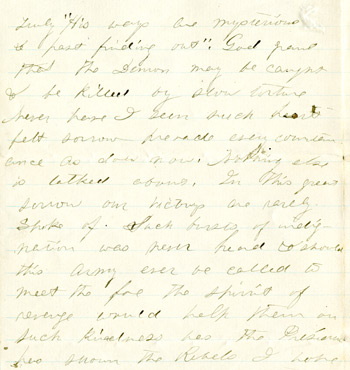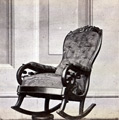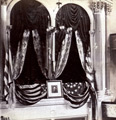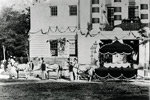Click Center Image for Full Size Picture
As the war drew to a close with the fall of Richmond on April 3, 1865, and Lee's surrender at Appomattox on April 9, there were Southern sympathizers who believed that the Confederacy could be restored. John Wilkes Booth held that belief, and it was the motive behind his plot to murder President Abraham Lincoln. On April 14, 1865, while watching the play Our American Cousin at Ford's Theater in Washington, D.C., with his wife, Mary, Lincoln was assassinated by Booth.
Lincoln's assassination deeply affected Abial Edwards. Edwards and the Twenty-ninth Maine were in the Shenandoah Valley when the war ended and news of the assassination reached them. In his letter to Anna on April 16, he described the shock and sadness that came with the news. He told her that nothing else was talked about among the soldiers, not even the Union's victory. In his letter, Edwards wrote that "revenge is in the cry of the army and by all." He told her that he hoped the kindness that their beloved president showed the Rebels was never shown to them again, because they had robbed the Union of their noble leader. Edwards, as did many other soldiers, felt it was unfortunate that Lincoln would not live to see the fruits of his labor and enjoy the Union victory.
When the Nineteenth Corps, of which the Twenty-ninth Maine Regiment was a part, moved camp to Washington, D.C., Edwards and the other soldiers saw Lincoln's funeral train, covered in crepe and decorated with flags.
Summit's Point, Virginia.
Edwards described it as the gloomiest sight he had ever seen and simply stated that "it looked sad." In a letter to his sister Marcia on April 22, 1865, Edwards described how the entire city of Washington, D.C., was in mourning. He noted that the White House, War Department, Capitol, and every private and public house were trimmed with crepe. Flags were at half mast. In closing, he told Marcia that "everything and everybody is mourning."






